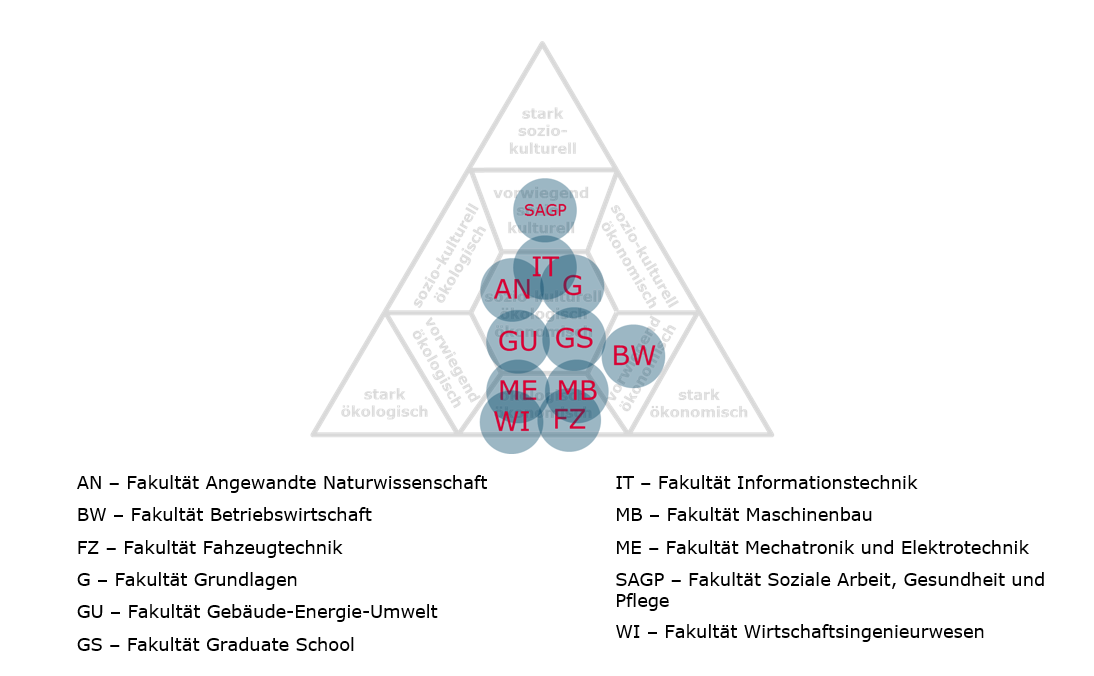
Safeguarding the livelihoods of future generations through sustainable development is the object of a range of different initiatives at Esslingen University of Applied Sciences, particularly in its research and technology transfer. By setting up the Centre for Sustainable Development Studies (SNE), which is situated at the Faculty of Building Services, Energy and Environmental Engineering, we ensured that this important topic also became an integral part of our teaching.
Safeguarding the livelihoods of future generations through sustainable development is the object of a range of different initiatives at Esslingen University of Applied Sciences, particularly in its research and technology transfer. By setting up the Centre for Sustainable Development Studies (SNE), this important topic also became an integral part of our teaching.
Integrating the topic of “Sustainable Development” in the curricula of all our facultieswas deemed to be an all-encompassing task of organisational development right from the outset: The idea is to implement appropriate, targeted intervention measures to stimulate group dynamics within the university which will bring about a planned, organisational change in the long term. The aim is to change the organisational culture so that the topic of “sustainability” becomes an integral part of the organisation. Since 2012, the value of “sustainability” has been incorporated into our guiding principle: “We exercise environmental, economic and social responsibility in the actions we take, our teaching and our research.” The IQF project titled “Centre for Sustainable Development Studies” has now provided us with a unique opportunity to
- make this guiding principle reality
- operationalise it for our teaching and
- implement it across the organisation.
With the support of the President's Office, agreement was reached with the 11 previous faculties of the university to draw up a faculty-specific understanding of sustainability in intra-faculty workshops chaired by the SNE. The aim was also for the faculties to position themselves within Hauff’s integrative sustainability triangle and state the type of their sustainability understanding.
Faculty-specific sustainability profiles and competence atlases
The overall approach to sustainability adopted by Esslingen University of Applied Sciences has been deliberately kept open-minded and subject to group dynamics, because what sustainability means is sometimes controversial. The faculties may possibly have different approaches, prioritisation strategies, or strategies on how to deal with conflicts of objectives here. The objective of the SNE project was therefore primarily to create a new “discursive space” about how sustainability is to be understood – on both the “interdisciplinary” and the “transdisciplinary” level.
The respective faculty-specific understanding of sustainability furthermore forms the basis for drawing up sustainability profiles within the faculty for the individual degree programmes. The sustainability profiles of the degree programmes serve to determine the starting position and are intended to help identify aspects of the teaching which are lacking or not afforded sufficient consideration, and to ensure the sustainability-related topics are developed continuously during the degree programme. Ultimately, the sustainability profiles also form the basis for the systematic accounting of educational content for a sustainable development (for example as part of the further development of the EMAS environmental management to an EMASplus-based sustainability management). In each faculty, a specific competence atlas with contact persons was drawn up on the basis of the sustainability understanding, a central phone directory for sustainability, as it were, in which key actors at the university were named and made visible together with their areas of responsibility. The document “Sustainability roadmap for research and teaching at Esslingen University of Applied Sciences” was thus created step-by-step, and it enables those within the organisation and those outside it to find out about “sustainability” in the teaching and research at Esslingen University of Applied Sciences.
Basis for further discourse and decisions: The sustainability roadmap for Esslingen University of Applied Sciences
While the university governing bodies (Senate, University Board) were engaged on the compilation and approval of the “Sustainability roadmap”, an attempt was made to initiate a fundamental discussion on the constitutive elements of an “education for sustainable development” (BNE) at Esslingen University of Applied Sciences, in which existing national and international discourses on the topic were reviewed and operationalised for Esslingen University of Applied Sciences. In this context, a model with corresponding learning objectives and content on various cognitive levels was drawn up as a proposal and discussed with members of the Advisory Board, members of the University Board and interested colleagues.
Integration of the Environmental Management activities (EMAS)
A further strategic approach was to draw up a proposal in the form of a project application to develop a normative system for integrating the activities of Environmental Management (EMAS) and those of Sustainable Development. The key objective of this approach, which further developed the approach of EMASplus, was to further develop the EMAS environmental management system, which was designed almost exclusively for the running of the university, towards lean and integrated sustainability management including university-specific sustainability reporting which was oriented on the requirements of the university. This application was rejected by the President's Office without the SNE being involved in the decision making. And this although the further development of the environmental management in the operation of the university towards comprehensive sustainability management in teaching, research and university operation seems to be absolutely imperative. This would afford the university the opportunity to direct the focus of the activities more on environmental and sustainability factors which it itself can influence.
Sustainability Innovation Fund for in-house funding
As an essential instrument of the organisational development, a “Sustainability Innovation Fund” was set up during the lifetime of the SNE project via which in-house calls for applications for funding were made on a regular basis. Students and lecturers could apply for funding for interdisciplinary and transdisciplinary projects on the topic of sustainability. When funding was approved, the SNE provided organisational support to realise the projects, sometimes enhanced by its own teaching input, and acted in an advisory capacity to further develop the projects together with the lecturers.
Further details on the Centre for Sustainable Development Studies project can be found in the Final report and in the Sustainability roadmap for Esslingen University of Applied Sciences.
Interested? Apply now! for the wintersemester 2025/2026
Get started
find a course
